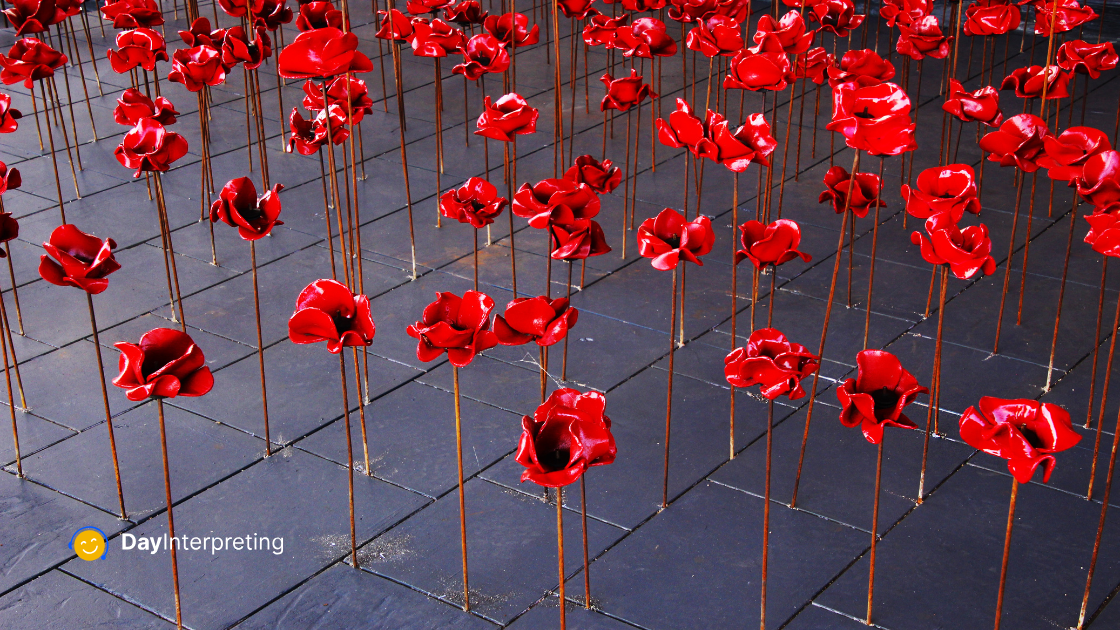When we think of war heroes, we often envision soldiers on the front lines, medics in combat zones, or journalists risking their lives to report the truth. But there’s another type of hero—less visible, often overlooked—who plays a crucial role in every military and humanitarian operation: the war zone interpreter.
Interpreters in conflict zones do more than translate words. They build understanding where tensions run high, help navigate cultural complexities, and often save lives simply by being the linguistic bridge between two worlds.
At Day Interpreting, we deeply admire the courage and commitment of interpreters who serve in war zones. And we’re proud to support and hire multilingual veterans—many of whom are uniquely equipped for these roles due to their military experience and language skills. This blog explores the vital role interpreters play in times of war, the challenges they face, and how veterans can find a meaningful second career in interpreting.
How Interpreters Operate in Conflict Zones
Conflict zones are chaotic, multilingual, and often unpredictable—think the Tower of Babel, but with assault weapons and explosives. Whether it’s a military mission, a humanitarian relief effort, or a diplomatic negotiation, communication must be clear, accurate, and immediate. That’s where interpreters come in.
Most interpreters working in war zones are contracted by the military, international peacekeeping missions like the United Nations, foreign affairs ministries, humanitarian NGOs, and global media outlets. Their primary job? Facilitating communication across languages and cultures, often under extreme pressure.
These interpreters may accompany soldiers during patrols, help military officials coordinate with local authorities, support journalists reporting on the ground, or assist doctors and aid workers treating civilians. In every case, their ability to render messages accurately can mean the difference between peace and violence—or even life and death.
The U.S. Army once described interpreters as both “helpers and weapons.” This isn’t hyperbole. A skilled interpreter might detect a suspicious gesture, defuse a tense negotiation, or help avoid a deadly ambush. There are documented cases of interpreters warning troops of landmines, identifying potential attackers, or preventing civilian casualties by clarifying a misunderstood command.
Challenges on the Front Lines of Communication
While their mission is to connect people, interpreters in conflict zones must navigate a minefield of physical, emotional, and ethical challenges.
- Constant danger: War zone interpreters are often exposed to the same threats as soldiers—gunfire, bombings, ambushes—but without the same protections. They’re frequently targeted by enemy forces who see them as traitors or collaborators.
- Emotional toll: Interpreting in traumatic, high-stress environments takes a mental and emotional toll. Witnessing violence, translating tragic news, or conveying threats can have lasting psychological effects.
- Ethical tightrope: Interpreters must remain neutral, even when interpreting messages that contradict their personal beliefs or put their communities at risk. In some instances, interpreters have been pressured to manipulate messages or censor sensitive content. Upholding ethics under such pressure is one of the most difficult aspects of the role.
- Cultural misperceptions: Interpreters often find themselves stuck between two sides—military personnel who may not fully understand local customs, and local communities who may view interpreters as extensions of the occupying force. This ambiguity can lead to mistrust, rejection, or even retaliation.
Are War Interpreters Truly Neutral?
In theory, yes. Interpreters are trained to be impartial, to faithfully and accurately render the message without bias. But in practice—especially during wartime—neutrality can be a moving target.
Take, for example, the Afghan interpreters who worked with U.S. forces. They played an essential role in counterterrorism operations, intelligence gathering, and civil-military relations. Yet many were viewed by their own communities as traitors. After U.S. withdrawal, some were left behind and became targets for retribution. Similar stories have played out in Iraq, Syria, and other war-torn regions.
Being seen as “on the side” of foreign forces makes interpreters particularly vulnerable—even when their only allegiance is to communication itself.
A Second Mission: Veterans Becoming Interpreters
At Day Interpreting, we recognize the unique value that veterans bring to the world of language services—especially those with experience in military operations and multilingual settings. That’s why we actively hire and support veterans transitioning into second careers as interpreters.
Bilingual veterans are often perfectly positioned for these roles. Their firsthand knowledge of military protocol, discipline, and high-stakes environments makes them natural candidates for interpreting in complex or high-risk scenarios. They understand the pressure of operating under fire, the importance of precision, and the chain of command—all essential qualities in a conflict interpreter.
For some veterans, becoming an interpreter isn’t just a career move; it’s a continuation of their service. It allows them to help protect lives, deescalate conflict, and support humanitarian missions—all without carrying a weapon.
We believe in giving back to those who’ve served—and empowering them to serve again, this time with the power of language.
Advocating for Interpreter Protections
Despite their vital role, war zone interpreters often receive little recognition and even less protection. While there has been some progress, such as Special Immigrant Visas (SIVs) for interpreters who assist the U.S. military, global efforts are still lacking.
International organizations, including AIIC (International Association of Conference Interpreters) and Red T (a nonprofit dedicated to protecting translators and interpreters in conflict zones), are advocating for a UN resolution that would grant interpreters and translators protected status—similar to the protections given to journalists under international law.
Until then, many interpreters remain vulnerable to retaliation, with no legal recourse and limited options for relocation or asylum.
Language Access Matters—Especially in Conflict
At Day Interpreting and our sister company, Day Translations, we believe language access is a human right—especially during times of crisis. Every message, every directive, every plea for help deserves to be heard and understood.
We salute the bravery of interpreters working in war zones. These professionals aren’t just translating words—they’re translating humanity, and often doing so at great personal risk.
We also welcome multilingual veterans who want to bring their skills and service spirit into the interpreting profession. If you or someone you know is a veteran with language abilities, we invite you to explore opportunities with us. There’s always a place for courage, honor, and clarity at Day Interpreting.
Interested in joining our team or learning more about interpretation in high-risk zones?
Contact us today or explore career opportunities on our website.





0 Comments